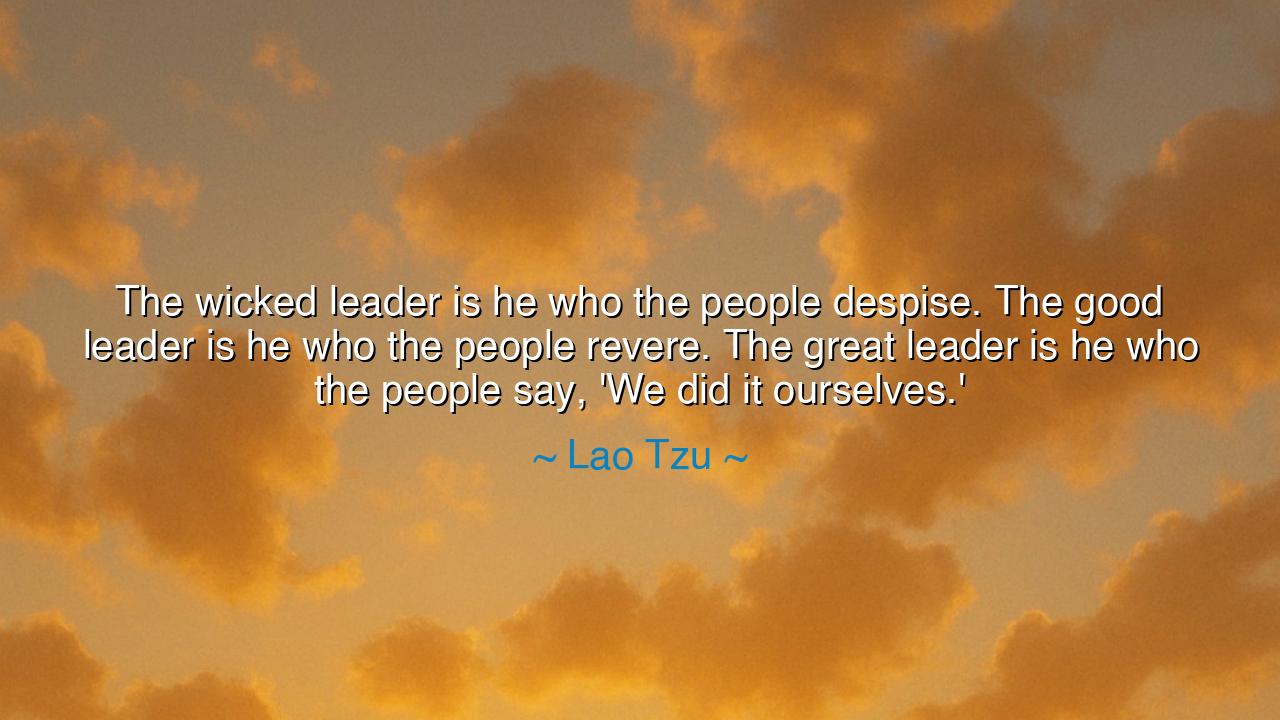
The wicked leader is he who the people despise. The good leader
The wicked leader is he who the people despise. The good leader is he who the people revere. The great leader is he who the people say, 'We did it ourselves.'






“The wicked leader is he whom the people despise. The good leader is he whom the people revere. The great leader is he whom the people say, ‘We did it ourselves.’” So spoke Lao Tzu, the sage of ancient China, whose wisdom flowed like a quiet river through the centuries. In these few words lies the essence of true leadership, a teaching not of conquest or command, but of humility, service, and trust. For Lao Tzu saw that the mightiest ruler is not the one who stands above his people, but the one who stands behind them, guiding unseen, letting them believe that their triumphs are their own.
In the Taoist way, leadership is not the art of domination, but of harmony. The wicked leader, blinded by greed and ego, rules by fear and deceit. His people obey because they must, not because they wish to. His power is brittle, for it rests upon resentment. The good leader, nobler in spirit, earns respect and obedience through justice and strength — yet still he stands apart, for his glory remains his own. But the great leader, the one who walks in the rhythm of the Tao, disappears into the very fabric of his people’s will. He leads without boasting, commands without shouting, and when the work is done, the people say, “We have done it ourselves.” Such a leader does not crave the crown, for his joy is the flourishing of others.
This teaching found its echo in the heart of history. Consider George Washington, who led a fledgling nation through the storms of revolution. When victory came, the people would have made him king. Yet he refused the throne, choosing instead to return to his fields at Mount Vernon. In that act of humility, he taught a nation what it meant to be free — that leadership’s highest form is self-restraint, not self-exaltation. The republic endured because its founder did not clutch power for himself. Like Lao Tzu’s great leader, Washington led so that his people might stand on their own.
Contrast this with the tyrants of every age — those who ruled through fear, silencing voices and breaking wills. They mistook obedience for strength, thinking that the people’s silence was loyalty. Yet when their statues fell, the dust swallowed their names. History remembers not their empires, but their downfall. For as Lao Tzu taught, force breeds resistance, and ego breeds decay. The leader who seeks only to be obeyed plants seeds of rebellion; the one who seeks to serve plants seeds of endurance.
The great leader, by contrast, is like the wind over grass — invisible, yet shaping everything it touches. He does not claim credit; he empowers others to claim their destiny. In the presence of such a leader, people rise — not because they are commanded, but because they are inspired. He is the shepherd who walks behind the flock, guiding gently so that they believe they are moving by their own will. That is the paradox of wisdom: the greatest power is the one that does not need to display itself.
We see this principle even in the smallest circles of life — in the teacher who awakens curiosity instead of forcing answers; in the parent who lets the child stumble so that strength may grow; in the manager who nurtures confidence instead of fear. Such leaders may seem quiet, even invisible, yet their influence endures long after their presence fades. The world advances not through those who shout “Follow me!” but through those who whisper, “You can do it.”
The lesson of Lao Tzu’s words is clear: true leadership is service. To lead well, you must let go of control. To be revered, you must first listen. And to be great, you must make others believe in their own greatness. This is not weakness, but mastery of the spirit — the wisdom of one who knows that the river flows not by pushing the water, but by guiding its course.
So, to those who would lead — in home, in work, or in the world — remember this ancient truth: Do not seek to be feared, nor even to be admired. Seek instead to awaken the strength within others. And when your task is done, when your people stand tall and say, “We did it ourselves,” — then, and only then, will you know that you have become a great leader.






AAdministratorAdministrator
Welcome, honored guests. Please leave a comment, we will respond soon